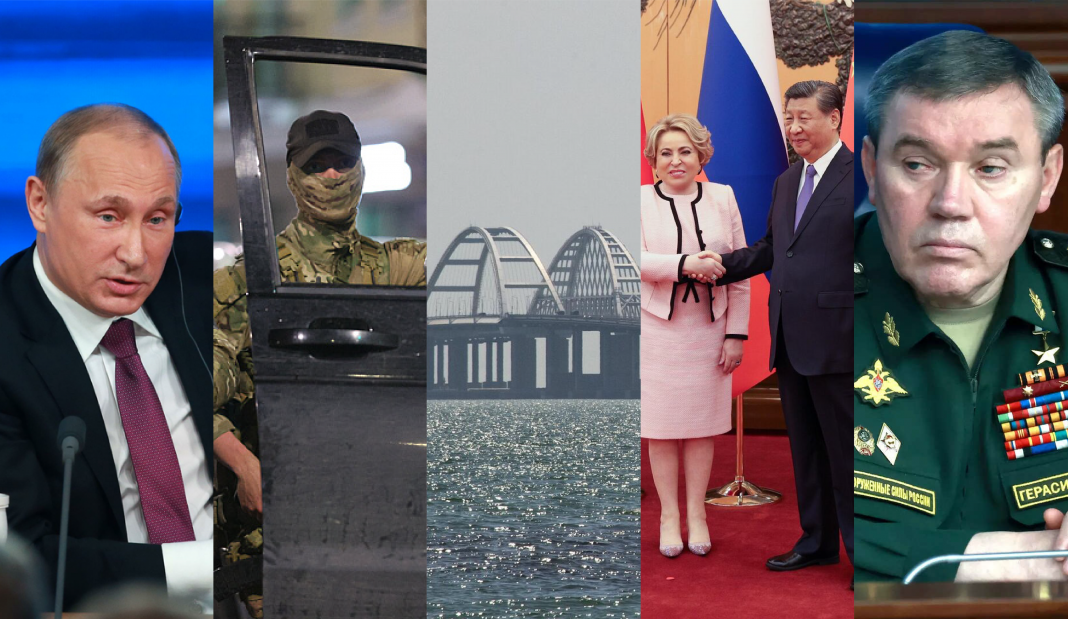This report describes the key events that significantly impacted Russia’s political, economic and social processes.
Based on the results of the past week, the following trends can be summarised:
- Russia officially announces the temporary termination of the Black Sea Grain Agreement, threatening all Ukrainian grain exports. First, such a step is a severe blast to bilateral relations between Putin and Erdogan since the Turkish president was considered the main beneficiary of such an export scheme. Soon, we should expect serious consequences, reflected in diplomatic relations between Moscow and Ankara.
- There is more and more information that active negotiations are underway between Moscow and Washington on several global issues. In particular, we are talking about Ukraine. Of course, in such a situation, one should not expect a sharp cessation of hostilities or solutions to the most pressing issues. Instead, one can be said that for both countries, the issue of Ukraine is as important as it is a dead end, making them look for possible compromises and make concessions.
- Another attack on the Crimean (Kerch) Bridge shows that parties are interested in continuing the conflict even with the theoretical existence of certain agreements and an attempt to de-escalate. Of course, the coincidence of the attack on the bridge with the end date of the “grain deal” may also indicate a targeted provocation. Still, a few hours after the attack, one gets the impression that its consequences will be more global and long-lasting.
This report describes the topics being the most relevant for Russia during 10-16 July:
1. The “Grain Deal” situation
2. Relocation of the Wagner PMC to Belarus;
3. Putin’s comments for the media;
4. Putin’s meeting with the permanent members of the Security Council of the Russian Federation;
5. Peskov’s statement about Putin’s meeting with Prigozhin;
6. Visit of the delegation of the Federation Council to China;
7. Visit of the Prosecutor General of the Russian Federation Igor Krasnov to Beijing;
8. Changes in the Russian military leadership;
9. Murder of Stanislav Rzhitsky in Krasnodar;
10. The case of the assassination attempt on Margarita Simonyan and Ksenia Sobchak;
11. Telephone conversation between Sergei Naryshkin and William Burns;
12. Detention of former FSB colonel Maksim Polyakov;
13. Attack on the Crimean (Kerch) Bridge.
This Content Is Only For Subscribers
- The “Grain Deal” situation
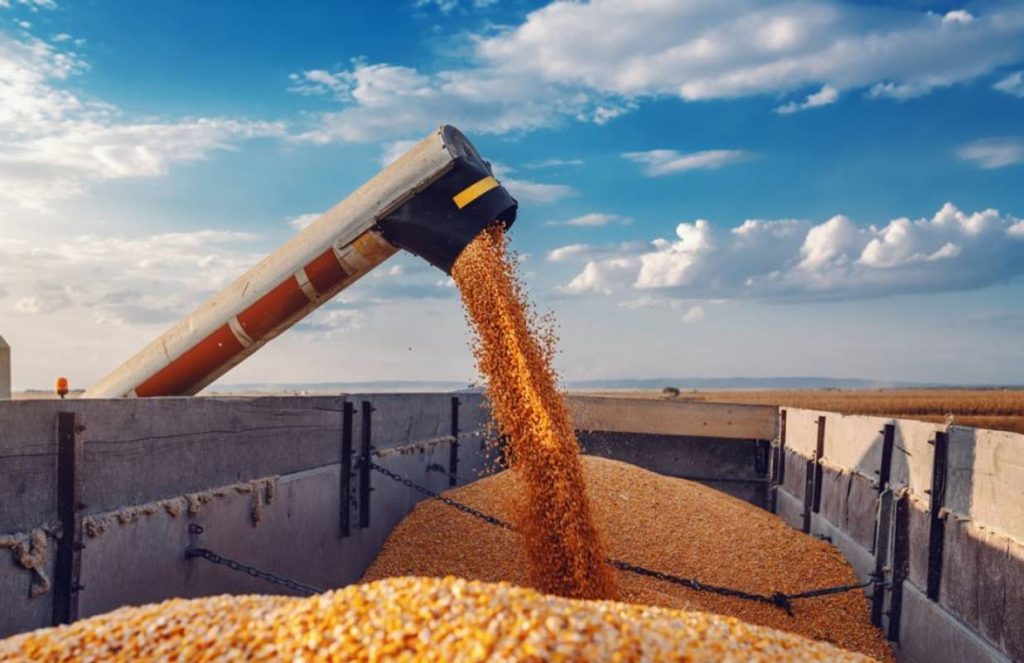
On Monday, July 17, the deadline for the next extension of the Black Sea Grain Initiative, commonly known as the “Grain Deal”, expires. Like last week, there have been a lot of announcements on this subject from all sides. Despite the confidence of Turkish President Recep Erdogan that the initiative will be extended, the Russian side is increasingly confident that such an extension is impossible without first fulfilling its conditions. In particular, it is about connecting Rosselkhozbank to the SWIFT system and unblocking the Togliatti-Odessa ammonia pipeline.
Timeline:
- On Monday, July 10, Putin’s press secretary Dmitry Peskov once again accused Turkey of violating agreements when returning Azov commanders to Ukraine. According to him, Moscow will consider this situation in the following agreements with Ankara. He also noted that the gas hub project in Turkey remains in force, but the situation with the grain deal “has not changed for the better.”
- On Tuesday, July 11, during another attack by Russian drones, two UAVs hit a building in one of the ports of the Odesa Oblast. Due to the fall of debris, two port terminals caught fire, including a grain terminal.
- UN Secretary-General António Guterres sent a letter to Putin about extending the “grain deal”. The purpose of Guterres’ proposal to Putin is to remove obstacles to the operations of the Agricultural Bank and ensure the continued operation of the Black Sea Grain Initiative. He also puts forward a proposal to harmonise both parts of the deal.
- On Wednesday, July 12, Turkish President Recep Erdogan, on the sidelines of the NATO summit, said that Turkey continues negotiations to extend the grain deal and is studying the conditions of the Russian Federation. He also said that he wants to discuss this issue with Putin.
- Reuters, citing three sources, said that the European Union is considering lifting sanctions and connecting a subsidiary of Rosselkhozbank to SWIFT. The goal is to allow transactions with grain and fertilisers for Russia, which is expected to extend the “grain deal”.
- Commenting on the message of the UN Secretary-General that Moscow was offered to remove obstacles to the operations of the Russian Agricultural Bank and ensure the further work of the deal. The Russian Foreign Ministry, Sergey Lavrov, said he was unaware of any new proposals for a grain deal. Lavrov also declared on the discussion with Turkey of some new deal for grain supply to “developing countries”: “We are talking about the fact that Putin and Erdogan have been discussing for a long time. Namely, about our readiness, and the readiness of Turkey itself, to work, regardless of any other agreements, on preferential grain supplies, primarily wheat, to developing countries that require this commodity.”
- On Thursday, July 13, the operational command “South” of the Armed Forces of Ukraine announced that the Russian Federation attacked the Snake Island again, dropping a high-explosive bomb on it. The Ukrainian side linked the attack on the island with the possibility of extending the “grain deal”.
- In one of the public comments regarding extending the “grain deal”, Vladimir Putin said: “We have voluntarily extended the grain deal many times, enough in the end – Russia will extend the grain deal only when the promises made to it are fulfilled.”
- Kremlin spokesman Dmitry Peskov said there is no final decision on suspending Russia’s “grain deal” participation.
- Representative of Turkey’s ruling Justice and Development Party, Omer Celik, said that Erdogan expects to hold talks with Putin before the completion of the “grain deal”. The president’s party also states that Ankara does not expect a crisis in Turkish-Russian relations.
- BILD periodical published the column of the British expert Robert Sutton, who believes that the Russian Federation can arrange a naval blockade of Ukraine in case of a break in the “grain deal”. The expert notes that the Russian Federation has several possibilities for this: ships of the Black Sea Fleet of the Russian Federation can directly attack merchant ships that leave Odesa; land in the port of Odesa of special forces; mine the routes of grain carriers, while accusing Ukraine of undermining them; the attack of grain carriers by submarines and also the accusation of Ukraine; the shelling of grain carriers from aircraft.
- On Friday, July 14, Recep Erdogan announced preparations for Putin’s visit to Turkey in August. He also said that he and the President of the Russian Federation have “common positions” on the “grain deal”.
- The Russian Defense Ministry said that “an unknown number of mines” are drifting in the northwestern part of the Black Sea, “posing a threat to shipping.” The ministry also noted that the reason for this is “the irresponsibility of the Ukrainian Navy.”
- AFP agency citing Recep Erdogan, said that Putin agreed to the extension of the grain deal. Later, this information was denied by Dmitry Peskov.
- The Ukrainian website Strana.ua, citing government sources, said that the Ukrainian authorities admit that after July 17, the grain corridor will not work. According to the publication, in case of a resumption of the naval blockade, the main routes for exporting Ukrainian grain will be the Danube ports, Polish Gdansk and Gdynia, and Romanian Constanta.
- Representative of the UN Secretary-General Stephane Dujarric said that the joint coordination centre in Istanbul has not issued permission for ships to enter the Black Sea as part of a grain deal for more than two weeks.
- On Saturday, July 15, Russian media began to spread information that Moscow could agree to extend the grain deal if the West accepts the proposal of UN Secretary-General António Guterres to lift sanctions from the subsidiary of “Rosselkhozbank”.
- In a conversation with South African President Cyril Ramaphozoic, Putin reiterated that Russia’s conditions for extending the grain deal have not been met: “The commitments set out in the relevant Russia-UN memorandum to remove obstacles to the export of Russian food and fertilisers still remain unfulfilled.”
Outcomes and outlook:
Russia has repeatedly stated that under the circumstances, the “grain deal” is unprofitable and may not extend it. However, such statements are heard on the eve of each re-signing. In fact, Russia would like to bargain for itself at least some preferences. And if in May, the re-signing of the “grain deal” was conjugated with the need to support its ally, Erdogan, then in July (especially against the backdrop of the Turkish president’s clearly unfriendly steps towards Russia), such moral obligations do not apply. And the West, which is interested in the “grain deal”, is not ready to offer other forms of preferences.
The possible lifting of sanctions from the “daughter” of Rosselkhozbank is important but far from the main concession to Russia. In addition, the strikes on the Kerch Bridge, which occurred just the night before the possible signing of the “grain agreement”, indicate that some Western parties are not interested in extending the deal.
Thus, the deal’s fate remains uncertain: if Russia signs it, it will be a diplomatic humiliation for Moscow; if it does not, it will finally drive a wedge in relations between Putin and Erdogan.
- Relocation of the Wagner PMC to Belarus
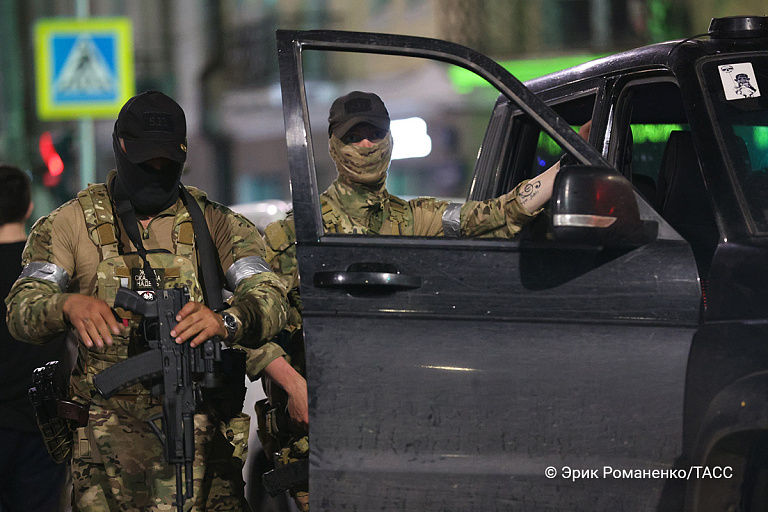
This week, the topic of the relocation of Wagner PMC fighters to the territory of Belarus has again become more active. Earlier, many media have repeatedly published information about creating field camps on the territory of Belarus to accommodate Wagner PMC fighters there. Still, there was no evidence of the movement of manpower. At the same time, in recent days, several convoys with supposed equipment and PMC fighters have been recorded heading towards Belarus. Also, similar information was confirmed by Minsk.
Timeline:
- On Tuesday, July 11, the Ministry of Defense of Belarus announced that the Wagner PMC would “share experience” with the Belarusian army: techniques and methods of conducting combat operations by the Armed Forces of the Republic of Belarus.
- On Wednesday, July 12, the Ministry of Defense of the Russian Federation announced that the weapons of the Wagner PMC were transferred to the Russian army. These are 2 thousand pieces of equipment and weapons, including hundreds of tanks, MLRS, Grad, Uragan, Pantsir air defence systems, self-propelled artillery mounts, armoured personnel carriers and other weapons, as well as more than two and a half thousand tons of various ammunition and about 20 thousand units of small arms. According to the Ministry of Defense of the Russian Federation, dozens of equipment have never been used in combat.
- On Thursday, July 13, a video began to be distributed to several Russian media, in which convoys of Wagner PMC vehicles allegedly leave their “rear camps” in Russia and the temporarily occupied Luhansk Oblast. Because some of the cars had Belarusian license plates, many analysts suggested that the convoy was heading to Belarus.
- On Friday, July 14, a photo of Yevgeny Prigozhin in a tent appeared on Russian Telegram channels. Notably, the original photo’s metadata indicates the date of shooting June 12. That is, before the rebellion. At the same time, some Ukrainian media reported that in the photo, Prigozhin is in the Wagner PMC camp in Belarus.
- On Saturday, July 15, the Belarusian opposition media announced that a convoy of Wagner PMCs had arrived in Belarus. About 60 cars and trucks with self-proclaimed “DNR/LNR” license plates were witnessed in the morning. They entered from the direction of Krichev and moved through Rogachev towards Bobruisk and then to Osipovichi. The media speculated that they were on their way to a campground in the village of Celje.
- The State Border Guard Service of Ukraine confirmed the information about the appearance in Belarus of separate groups of Wagner PMCs: “We continue to monitor this situation to understand all the places where they will be deployed, how many of them there will be and what tasks they will perform.”
- Another video appeared on the web with a new Wagner PMCs column. Russian Telegram channels said the cars were moving along the Don federal highway through the Voronezh region in Russia.
- On Sunday, July 16, the State Border Guard Service of Ukraine announced that Wagner PMC mercenaries could be used for provocations on the Ukrainian border. Now, according to the State Border Guard Service, only a few hundred mercenaries have entered the territory of Belarus so far: “This number does not pose such a threat to Ukraine to create some kind of strike force, but Belarus can use them for more serious things, for example, to destabilise the situation on the border with Ukraine or with other countries with which Belarus borders.”
Outcomes and outlook:
It was only a matter of time before a part of the (relatively small) Wagner PMC moved to Belarus, especially after this issue was resolved through the mediation of Belarusian President Alexander Lukashenko at the end of June. Obviously, 5-6 thousand “Wagnerites” will not become a serious threat to Ukraine and Poland: they are destined for the role of either instructor in the process of creating new Belarusian PMCs or a “product for export” (primarily for the countries of the African continent).
Ascolta’s sources in Belarus note that, currently, there is no talk of creating a strike force for an attack on Ukraine or escalating the situation on the border with Poland. At the same time, it is quite likely that in the future, PMC “Wagner” may become exactly the tool that will be used to create provocations, mainly on the western borders of Belarus.
Now Belarus is becoming an intermediary involved in the supply of human resources to countries where bloody wars are being waged, or there is a need to control the resource base in the interests of specific forces (primarily Russian). Also, we can declare that Alexander Lukashenko is further turning into a player not only of the Belarusian but also of the all-Union level (meaning the Union State of Russia and Belarus) with a possible entry into the first roles by the end of 2023 – the beginning of 2024.
- Putin’s comments for the media
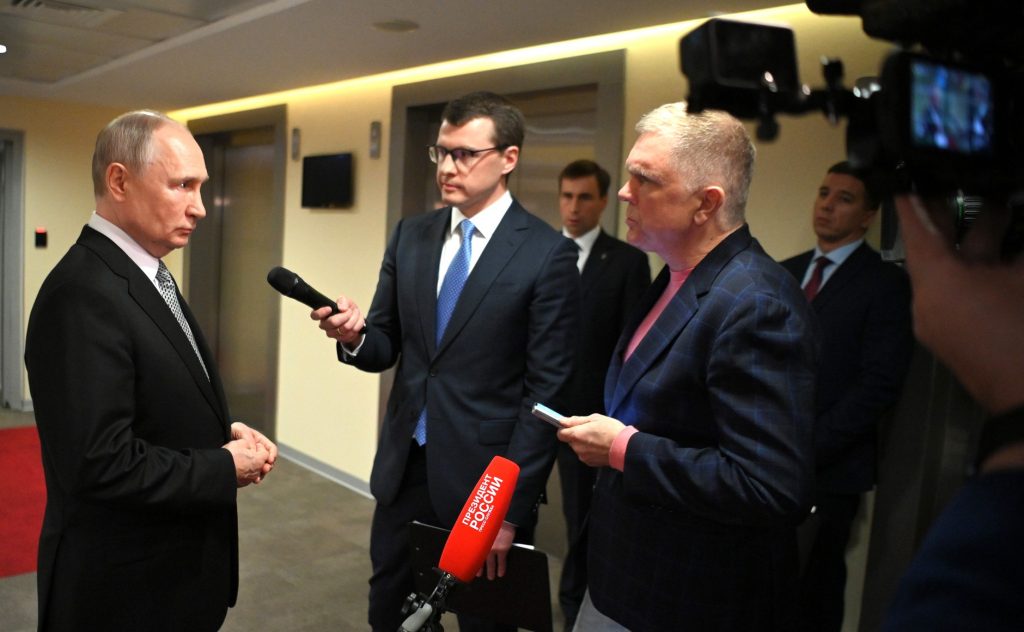
On Thursday, July 13, on the sidelines of the “Future Technologies Forum: Computing and Communications. The Quantum World” held in Moscow, Vladimir Putin gave comments to the media. In particular, issues of the results of the NATO summit in Vilnius and the possibility of extending the Black Sea Grain Initiative were touched upon.
Key theses:
- “As for Ukraine’s membership in NATO, we have repeatedly spoken about this – this obviously threatens Russia’s security. And, in fact, one of the reasons for the [so-called] special military operation is the threat of Ukraine joining NATO.”
- “As for the supply of various weapons, we see how many hopes were placed on the supply of missiles with a sufficiently long range. Well? Yes, they cause damage, but nothing critical happens in the war zone using these missiles. The same is foreign-made tanks and infantry fighting vehicles.”
- “As of last night, since July 4 alone, we have destroyed 311 tanks, of which a significant part, I think, one-third of at least Western production, including Leopards.”
- “We have said many times: any country has the right to ensure its security, and, of course, it has the right to choose the way to achieve this goal that it considers most correct for itself.”
- “I want to again emphasise that the rise in food prices, for food products, for what is produced by agriculture in the whole world, for fertilisers is not connected with the [so-called] special military operation. It is associated with the mistakes of the leading Western economies in finance and investment, including in energy .”
- “I have already said many times: out of the total volume of food, primarily grain, exported from the territory of Ukraine, three and a half per cent only went to the poorest countries in the world – only three per cent and a little. Everything else was shipped to a well-fed, prosperous Europe. But many European countries have begun to abandon Ukrainian grain. They started to discriminate against Ukrainian grain – not us.”
- “Nothing – I want to emphasise this – nothing was done. Everything is a one-sided game. Not a single point related to the fact that there are interests of the Russian Federation has not been fulfilled.”
- “There are still a few days, and we will think about what to do. But if we are told that they will fulfil the promises given to us, by the way, those made with the UN. And I know that the Secretary-General and the United Nations staff dealing with this problem are sincerely striving to fulfil the relevant conditions, including regarding Russia – I have no doubts. But nothing works out for them because the Western countries are not going to keep their promises.”
Outcomes and outlook:
In fact, Putin’s public activity and several statements indicate that he is trying to put a good face on a bad game. In his understanding, “everything is going according to plan.” He does not want to admit obvious mistakes and failures. First, he is trying to convince the public (through communication with the media) that the so-called “special military operation” is successful. The Russian military economy is developing – despite Western sanctions, Russia withstands economic and diplomatic blows.
Such bravado has been characteristic of Putin throughout the history of the invasion of the territory of Ukraine. It should be seen in the context of the overall policy of the regime: no matter how bad it is, to keep the brand, instilling confidence in its own citizens.
Considering the factor of the beginning of the election campaign, it can be assumed that such comments from the Russian president will appear more and more often. At the same time, the semantic load in them, as before, will be minimal.
- Putin’s meeting with the permanent members of the Security Council of the Russian Federation
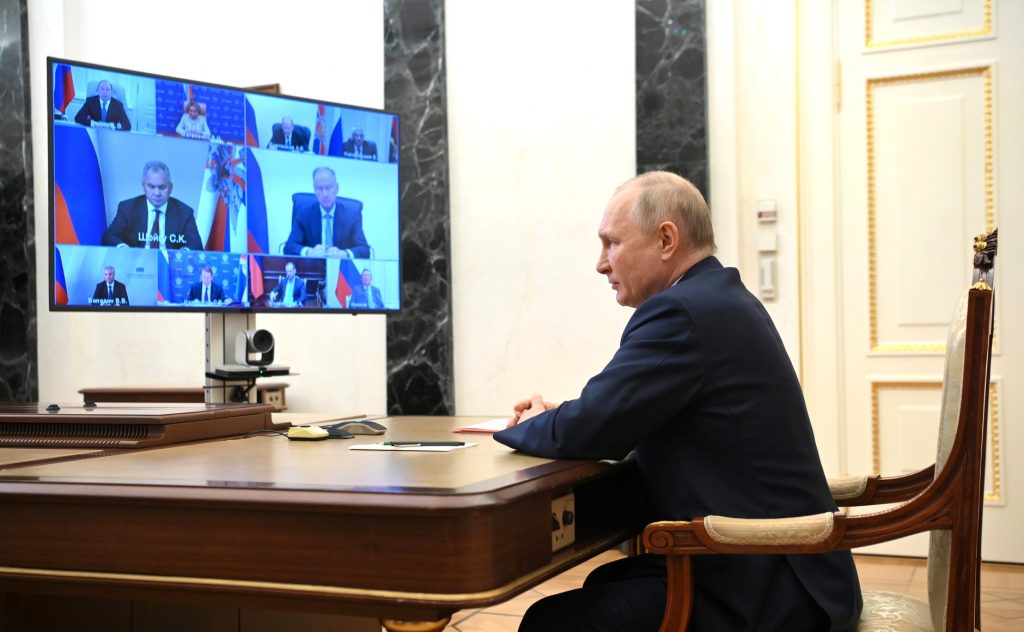
On Friday, July 14, Vladimir Putin held a meeting via videoconference with the permanent members of the Security Council. The meeting was attended by Chairman of the Federation Council Valentina Matvienko, Speaker of the State Duma Vyacheslav Volodin, Deputy Chairman of the Security Council Dmitry Medvedev, Chief of Staff of the Presidential Administration Anton Vaino, Secretary of the Security Council Nikolai Patrushev, Minister of the Interior Vladimir Kolokoltsev, Minister of Defense Sergei Shoigu, Director of the Federal Security Service Alexander Bortnikov, Director of the Foreign Intelligence Service Sergei Naryshkin, Special Representative of the President for Environmental Protection, Ecology and Transport Sergei Ivanov.
According to Putin, the main topic of the meeting was additional measures to protect critical infrastructure, with FSB Director Alexander Bortnikov as the keynote speaker.
Outcomes and outlook:
It is not a secret that critical infrastructure facilities in Russia have become targets for saboteurs and drone attacks. Moreover: Russia shows complete unpreparedness to protect its critical infrastructure (a huge territory requires an incredible amount of resources for the complete security of facilities).
It is obvious that issues related to strengthening the protection of enterprises cannot but worry the country’s leadership. But it is definitely not possible to provide a reliable security system today. Essentially, immediately after the meeting in the closed city of Novouralsk (Sverdlovsk region), a container with hexafluoride exploded at a uranium enrichment facility (the explosion occurred at a storage site for nuclear waste imported from the CIS countries). On Saturday, attacks on infrastructure facilities in Sevastopol were repelled. Also, the Russian authorities announced the prevention of an attack on the Kursk nuclear power plant. Two days later, supposedly Ukrainian saboteurs attacked the Kerch Bridge.
Russia is increasingly faced with the so-called “rail war” when the Ukrainian side hits exactly infrastructure facilities. It is unclear what Russia can oppose in this situation, but its defence actions look unconvincing.
- Peskov’s statement about Putin’s meeting with Prigozhin
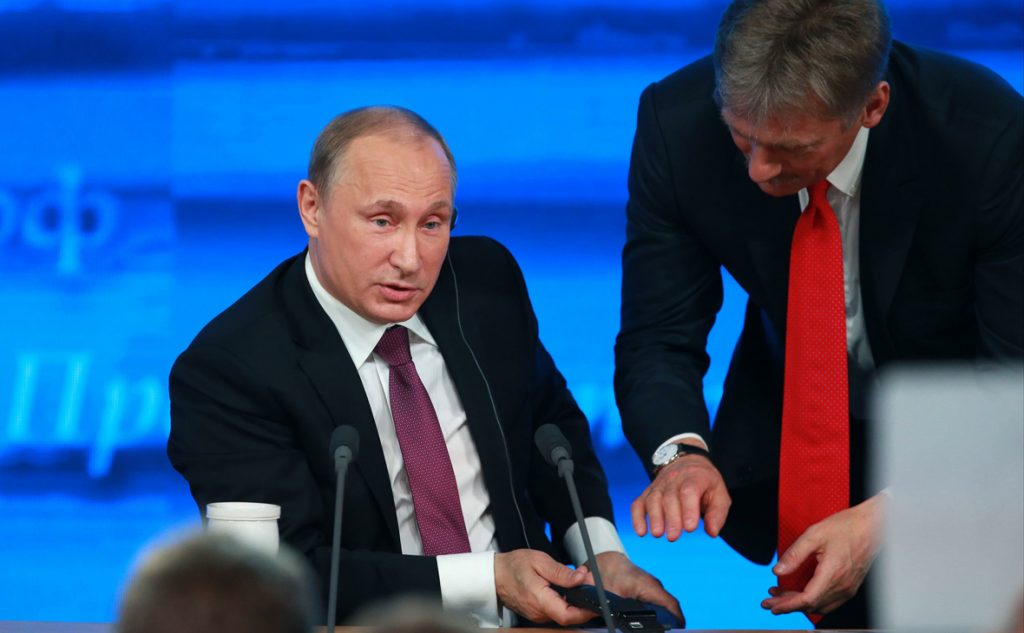
A few weeks after the attempted Wagner PMC rebellion, the matter of Yevgeny Prigozhin’s future received a new resonance. On Monday, July 10, Putin’s press secretary Dmitry Peskov said that a few days after the “Justice March”, Vladimir Putin met with the Wagner PMC’s commanders in the Kremlin. Yevgeny Prigozhin was also attending the meeting. According to Peskov’s statement, the mercenaries presented their version of what happened to Putin. They said that “they are staunch supporters and soldiers of the head of state and are ready to continue to fight.” Putin, in turn, assessed the actions of the Wagner PMC at the front, assessed what happened on June 24, and offered employment options to the representatives of the PMC.
Timeline:
- On Monday, July 10, the French journal Liberation, citing its sources in Western intelligence, reported that Prigozhin and Putin met on July 1 in the Kremlin. Also, allegedly, there were conversations with the director of the SMO, Naryshkin, and the head of the National Guard, Zolotov.
- Putin’s spokesman Dmitry Peskov confirmed that Yevgeny Prigozhin met with Putin in the Kremlin five days after the mutiny. According to him, the meeting lasted three hours, and PMC commanders also took part; there were 35 people in total.
- On Tuesday, July 11, the Head of the Main Intelligence Directorate of the Ministry of Defense of Ukraine, Kirill Budanov, in an interview with Reuters, said that the Wagner PMC reached the nuclear base in the Voronezh region during the mutiny, but could not get inside.
- On Wednesday, July 12, Dmitry Peskov called “another stuffing” information that during the Prigozhin rebellion, Wagner PMC reached a nuclear facility.
- On Thursday, July 13, during a conversation with reporters, Vladimir Putin spoke about the nature of the meeting with the commanders of the Wagner PMC and Yevgeny Prigozhin. In particular, he noted that the meeting took place on June 29. On it, he allegedly offered the Wagner PMC to continue serving in the same design, but under the leadership not of Prigozhin and Utkin but of the commander with the call sign “Seda” (Andrey Troshev). According to Putin, many “Wagnerites” were determined to accept such an offer, but Prigozhin said, “the guys don’t agree”.
Outcomes and outlook:
The fact of Putin’s meeting with Prigozhin and the “Wagnerites” confirms that the so-called “Prigozhin rebellion” was a staged act aimed at preventing a more significant rebellion or a coup d’état. Ascolta has repeatedly expressed this version.
Thinking about it: Prigozhin allegedly raises a rebellion, goes to Moscow, shoots down several planes and helicopters, experienced pilots die, and “Prigozhin’s people” almost seized a nuclear facility… And suddenly, they lay down their arms. Prigozhin was allowed not only to leave but also got his confiscated 10 billion rubles back as well as his personal weapons (and for this, he was invited to the FSB branch in St. Petersburg); he also got new contracts in Russia and, in the end, an audience with the president.
This is all against the backdrop of the purges that have begun in the army, the unknown fate of General Surovikin, etc. Thus, the “Wagnerites” and Prigozhin remain an element of the Russian military, but in a different format. The Kremlin meeting indicated that there is either no conflict or it has been solved. But, obviously, interesting revelations about the June 20, 2023 events are to come, as well as the genuine background of the events.
- Visit of the delegation of the Federation Council to China
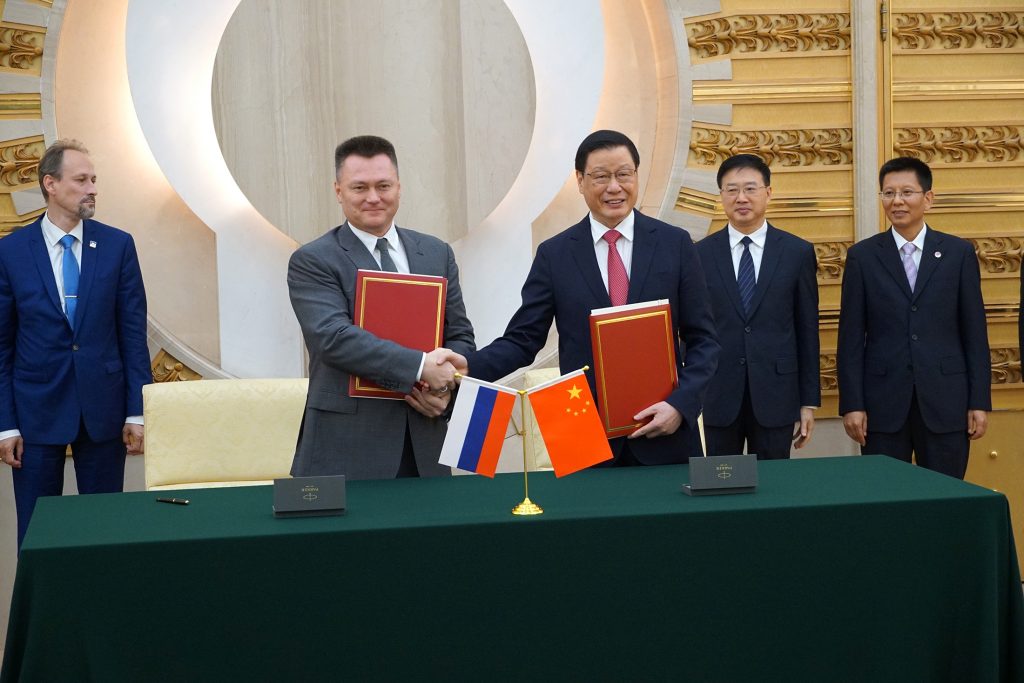
On Monday, July 10, the official visit of the Federation Council delegation, headed by Valentina Matviyenko, to China began. During it, Matviyenko met with President of the People’s Republic of China Xi Jinping, the Chairman of the Standing Committee of the National People’s Congress of the People’s Republic of China Zhao Leji, and the first secretary of the Committee of the Communist Party of China of Liaoning Province, the Chairman of the People’s Congress of Hao Province Pan. In addition, the delegation of the Federation Council held several other meetings and took part in some events. The visit lasted until July 12.
Outcomes and outlook:
In Putin’s circle, Valentina Matviyenko belongs to the so-called “pro-Chinese party”. So, it is not a coincidence that at some stage, she was expected to be the Russian ambassador to China. It is believed that Matvienko (formerly a professional diplomat) was at the forefront of promoting the thesis about the need to develop the Chinese direction as a priority.
Her recent visit to China should not be overestimated: this is a standard practice of inter-parliamentary relations. However, during the visit, she could convey certain personal messages from Putin to Xi Jinping and exchange views on several issues. On the eve of the BRICS summit, any contacts between the main players in this informal association, China and Russia, should be considered seriously, especially since the August summit may become historic.
- Visit of the Prosecutor General of the Russian Federation Igor Krasnov to Beijing
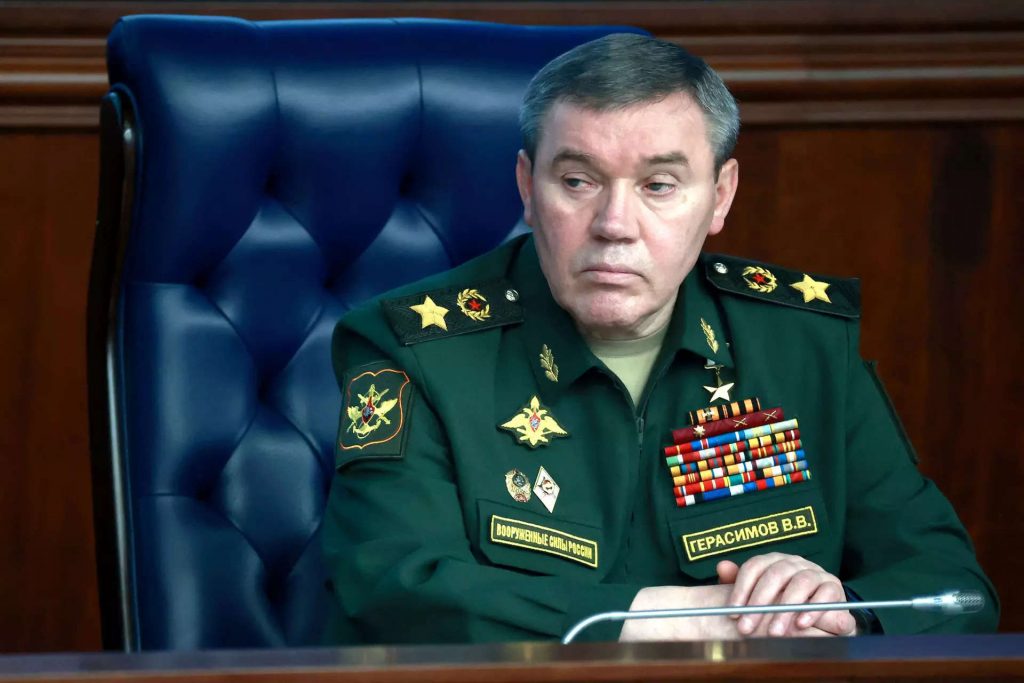
On Wednesday, July 12, the Russian Federation Prosecutor General, Igor Krasnov, arrived in Beijing on his first working visit. During the two-day visit, he held meetings with key law enforcement officers of the PRC. In particular, Krasnov held talks with his Chinese colleague Ying Yong, Secretary of the Political and Legal Commission of the Central Committee of the Communist Party of China (CCP), Chen Wenqing, Deputy Head of the State Control Committee of the People’s Republic of China Fu Kuem, Minister of Justice He Rong, Minister of Public Security Wang Xiaohong, and Chairman of the Supreme People’s Court of Zhang Jun.
Outcomes and outlook:
Igor Krasnov’s visit following Valentina Matvienko’s one is also interesting. Krasnov’s competence is not only about legal actions, and it certainly was not only about coordinating the topics of the jurisdictions of the two countries. At least two meetings with key politicians in China’s governance system, Chen Wenqing and Wang Xiaohong, are of genuine interest.
These are people who have an influence on the development of immediate decisions. Igor Krasnov is a new generation in Russian politics, a representative of the so-called “young wolves” group, gradually replacing the older generation of those in power. It is on them that Putin is betting. It is quite possible that Krasnov is expecting a new personnel appointment, and a trip to Beijing is also a kind of “bride show”.
- Changes in the Russian military leadership

Last week, there were several significant layoffs in the military leadership of the Russian Federation. In particular, a scandal erupted on the network due to the removal of the commander of the 58th Joint Arms Army of the Southern Military District, Major General Ivan Popov, who was allegedly punished for excessive criticism of the Chief of the General Staff of the Russian Armed Forces Valery Gerasimov. A few days later, information appeared about the dismissal of General Vladimir Seliverstov, the commander of the 106th airborne division, which is now fighting near Bakhmut. As in the previous case, the reason for the resignation is a conflict with the top army leadership.
Outcomes and outlook:
The reshuffle in the military leadership of the Russian Federation is the beginning of personnel purges. It is quite possible that the reason was not only the inefficiency of individual generals but also Putin’s fear of some kind of military conspiracy (which, most likely, was prevented in June by inspiring the “mutiny” of Yevgeny Prigozhin).
According to Ascolta, before the end of the summer in Russia, a number of resignations and reshuffles are expected, which will be aimed at eliminating any form of disobedience or threat from the army personally to Putin and his regime.
- Murder of Stanislav Rzhitsky in Krasnodar
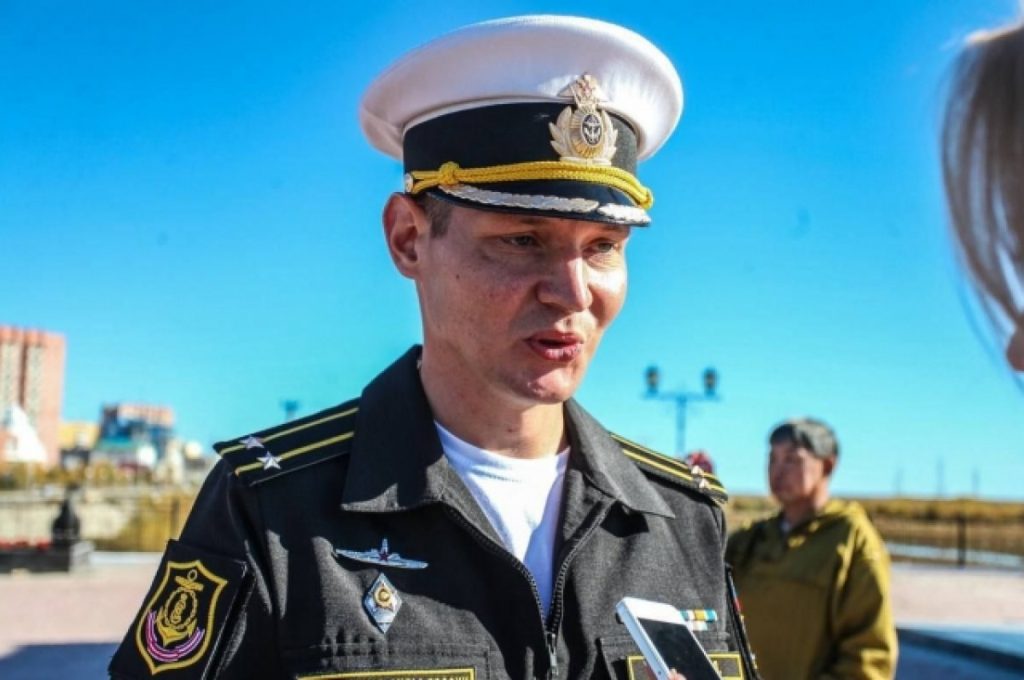
On Monday, July 10, information emerged about the murder of the deputy head of the department for mobilisation work, Stanislav Rzhitsky, in Krasnodar. He was shot while jogging in a park in the morning. Later, the Russian special services were able to find the killer. It turned out to be 64-year-old Ukrainian Sergiy Denisenko, who, after being detained, admitted his guilt and revealed cooperation with the Ukrainian special services.
Timeline:
- On Monday, July 10, news about the murder of Stanislav Rzhitsky appeared. According to officials, he was shot while jogging near the Olimpiisky sports complex. According to preliminary reports, several bullets were fired, hitting his back and chest. After that, Rzhitsky died on the spot. The shooter fled away.
- On Tuesday, July 11, the statement about the murder of the former commander of the Russian submarine “Krasnodar” Stanislav Rzhitsky was published on the website of the Main Intelligence Directorate of the Ministry of Defense of Ukraine. The agency did not claim responsibility for the murder but released details of the murder. According to further information, he was shot at around 6 am in a local park, and there were no witnesses around due to heavy rain.
- Later, the Investigative Committee of the Russian Federation reported the detention of a suspect in murdering the former commander of the Krasnodar submarine. It turned out to be the ex-head of the Ukrainian Shotokan Karate-do Federation of Ukraine Sergiy Denisenko.
- On Wednesday, July 12, the relatives of the murdered Stanislav Rzhitsky commented that he retired from the Russian army before the invasion of Ukraine started and did not take any part in the war.
- On Thursday, July 13, Sergiy Denisenko was arrested. A video was published on the Internet, in which he confessed to the murder of Rzhitsky on the instructions of the Ukrainian special services.
Outcomes and outlook:
The murder of Rzhitsky is a clear demonstration of the new tactics of the Ukrainian side, which is not afraid to use the experience of the Israeli Mossad (search and destruction of enemies). Apparently, such an operation is not the first and far from the last.
At the same time, it becomes clear that Russia is absolutely not ready for such tactics (as well as for a “rail war”). In conditions where Russia has a military advantage on the side, and Ukraine has an advantage in sabotage work, it is impossible to talk about Moscow’s victory in the war with Ukraine.
- The case of the assassination attempt on Margarita Simonyan and Ksenia Sobchak
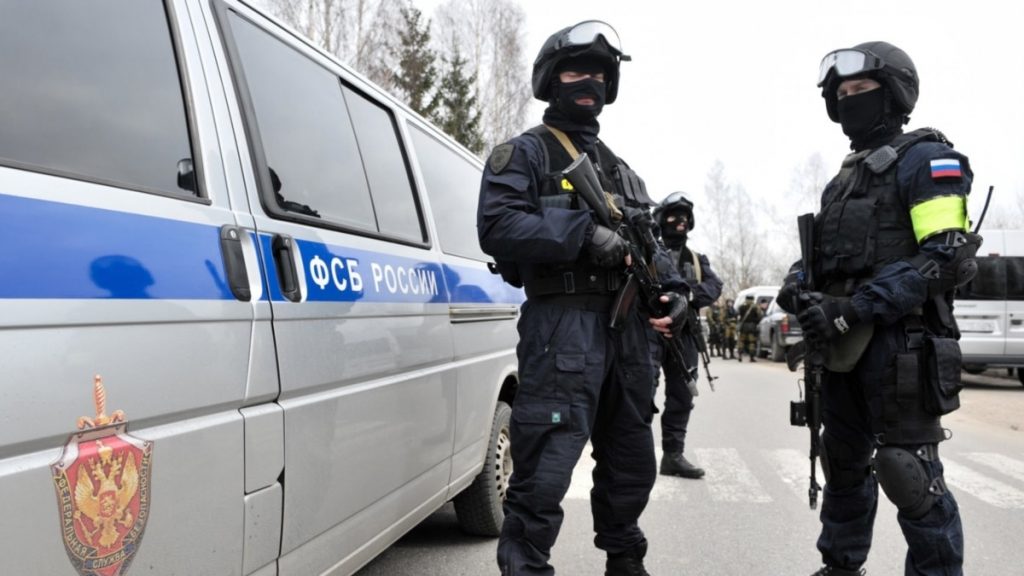
On Saturday, July 15, the FSB announced that they allegedly prevented the murder of the editor-in-chief of Rossiya Segodnya and RT Margarita Simonyan and journalist Ksenia Sobchak, planned by the Ukrainian special services. According to the Service, “the members of a neo-Nazi group” were detained in Moscow and the Ryazan region last Friday. They were conducting reconnaissance near the places of work and residence of journalists. The FSB also said that the detainees confirmed the preparation of assassination attempts on the instructions of the SBU for a reward of 1.5 million rubles (USD 16,500 approx.) for each murder.
Timeline:
- On Saturday, July 15, the FSB announced the prevention of the murder of the editor-in-chief of Russia Today and RT Margarita Simonyan and journalist Ksenia Sobchak, prevented by the Ukrainian special services. Later, they published a video of the interrogation of a guy born in 2005 in a T-shirt with Nazi symbols, who confesses in preparation for the murder of Sobchak and Simonyan.
- Later, another video was published. In it, the detainee stated that he created the Paragraph 88 group, which “contacted the SBU” and put up leaflets with a photo of Budanov, the head of the Main Directorate of Intelligence. After that, as the person in the video claims, they were tasked with killing Simonyan and Sobchak. And the cache coordinates with the machine gun, money and ammunition. According to him, they managed to conduct reconnaissance.
- Adviser to the Head of the Office of the President of Ukraine Mykhailo Podolyak declared the absurdity of such accusations: “We absolutely do not need them. These are obvious things. They absolutely do not affect anything.”
Outcomes and outlook:
Apparently, against the backdrop of frank failures and failures associated with the impossibility of a prompt response or prevention of terrorist acts, the leadership of the FSB took a staged action, announcing the preparation of assassination attempts on Margarita Simonyan and Ksenia Sobchak, as well as presenting the public with an “assaulted” neo-Nazi.
This is interesting, rather, as an informational occasion aimed at reassuring the public: they say that the special services are doing their duty and protecting the peace of citizens. The election of frankly media and “party” personalities as “targets” is aimed precisely at the media effect and the simple layman.
- Telephone conversation between Sergey Naryshkin and William Burns
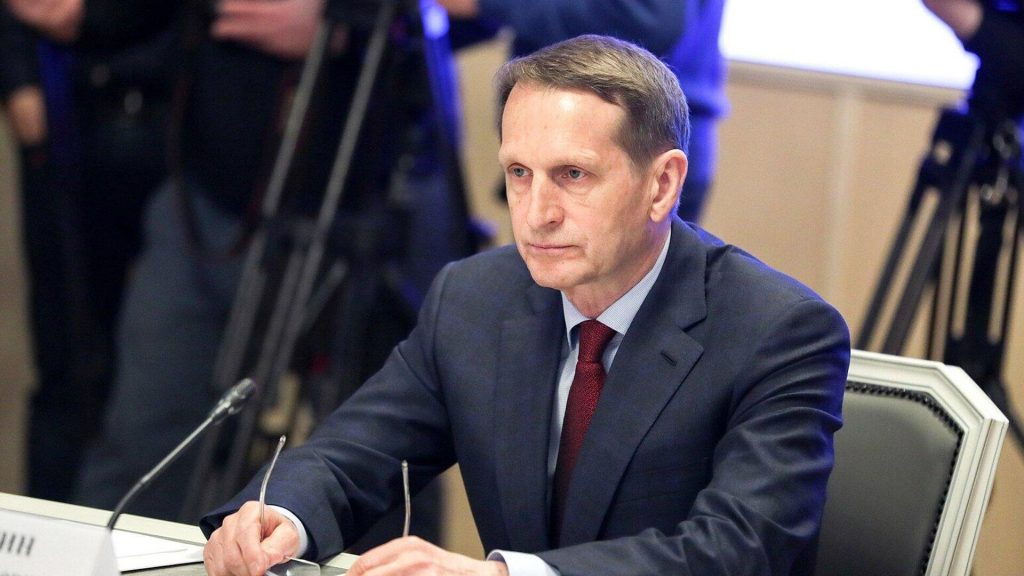
On Wednesday, July 12, Director of the Foreign Intelligence Service of the Russian Federation Sergey Naryshkin announced that at the end of June, he had a telephone conversation with the Head of the CIA, William Burns. According to him, during the conversation, they “thought and argued about what to do with Ukraine.” Naryshkin also said that his personal meeting with Burns is also possible in the future.
Earlier, the media reported that Naryshkin and Burns spoke a few hours after the start of Prigozhin’s rebellion, that is, on June 23-24. The American media then wrote that Burns conveyed the message that the United States was not involved in the rebellion.
Outcomes and outlook:
Keeping in mind the information published by some media, the American side conveyed to the Russians the following proposals regarding Ukraine:
- Freezing the front line;
- Ukraine signs a non-bloc status, and the matter of joining NATO becomes no longer relevant;
- Referendums are held in the territories of the L/DNR and Crimea, being held under UN supervision;
- Re-elections of all authorities in Ukraine and in Russia;
- Ukraine does not join NATO, but Ukraine (in 2025) and Moldova (in 2026) are accepted to the European Union. Both countries will maintain non-bloc status.
This information may be fiction and information stuffing, but in the existing situation, it looks pretty plausible. Another thing is that Burns’ proposals (if they exist) do not consider several points (including the genuine interests of Ukraine). Still, they look pretty realistic as a subject for further discussion.
Obviously, the negotiations between Naryshkin and Burns will soon determine the fate of the modern war in Ukraine.
- Detention of former FSB colonel Maksim Polyakov
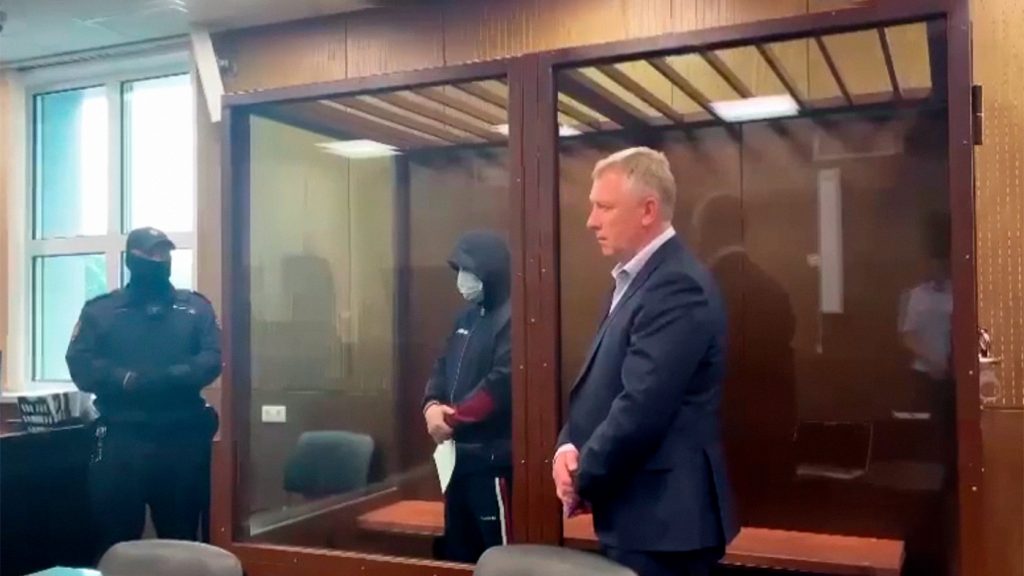
On Friday, July 14, news about the detention of former FSB colonel Maxim Polyakov, who allegedly controls the activities of several well-known Russian Telegram channels, appeared on the Internet. In particular, the Russian media name him the administrator of the “Kremlin Laundress” (246 thousand subscribers) channel. Notably, this channel stopped being updated immediately after Polyakov’s arrest. Later it became known that the court arrested Polyakov until September 13.
This topic has received much attention due to Polyakov’s unofficial accusations of connections with the former oligarch Mikhail Khodorkovsky, who allegedly finances the activities of many opposition Telegram channels and supplies them with information.
Outcomes and outlook:
Polyakov’s detention foregoes a cleaning-up campaign for the Russian Telegram’s political segment. Russia is preparing for presidential elections, and under these circumstances (considering the increase of Telegram’s impact on voters), the Russian leadership would like to control the so-called “independent” channels completely.
His detention is a signal to all the channel owners: either you work within specific ideological and informational frameworks, or you will come into conflict with the country, and the deanonymisation of Russian authors has already been cranked out. Shortly, we may witness more resonant detentions of Telegram channels authors and owners.
- Attack on the Crimean (Kerch) Bridge
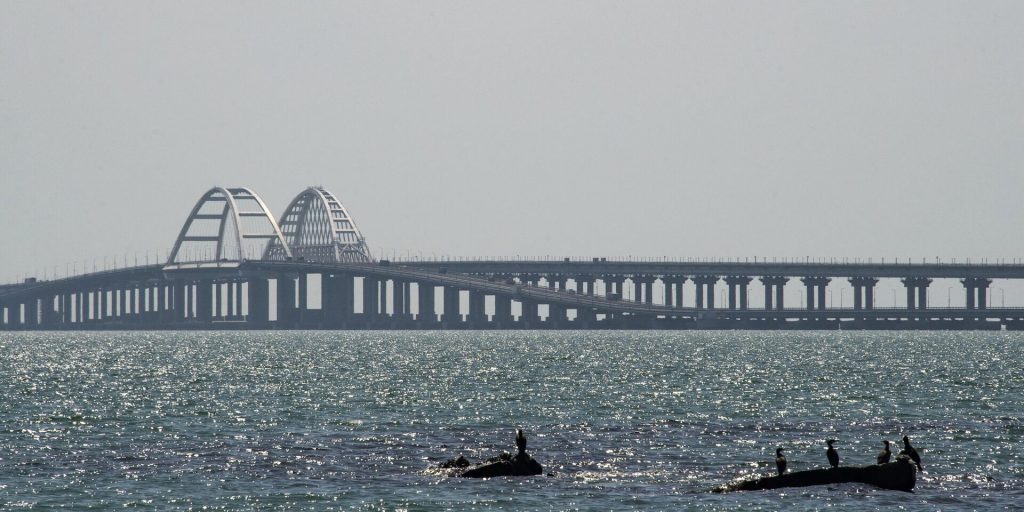
On the night of July 17, another attack on the Kerch Bridge took place. At about 3 am, residents of Kerch (a city in the east of the Crimean Peninsula) reported two massive explosions. The first video evidence of road surface damage emerged almost simultaneously. On Monday morning, it became known about the scope of the damage. The media reported the subsidence of one of the bridge’s spans next to the 145th pillar. There are also reports of injuries and deaths at the scene.
Timeline (as of 17 July’s morning):
- The “head” of the temporarily occupied Crimea, Sergey Aksyonov, announced an incident at the 145th pillar from the Krasnodar Territory. Aksyonov also offered to go to Crimea through the land corridor (that is, Melitopol).
- The Ministry of Transport of the Russian Federation announced the damage to the roadway, not mentioning the reason. In the morning, traffic across the bridge was blocked, but the trains were already allowed to run at 9 in the morning. The ministry also denied damage to the bridge piers.
- The authorities of the Krasnodar Territory announced the death of two people during the emergency and the injury of a minor girl.
- The Main Intelligence Directorate of the Ministry of Defense of Ukraine commented on the new explosion on the Crimean Bridge: “One can only quote the words of the head of the Main Intelligence Directorate, Kyrylo Budanov, that “the Kerch Bridge is an unnecessary construction there.”
- Several Ukrainian media have reported that the SBU is behind the attack on the Kerch Bridge. At the same time, on the official page of the SBU in social networks, a verse was published with a hint of the involvement of the service in undermining the bridge.
- The “South” operational command of the Armed Forces of Ukraine suggested that the damage to the Crimean Bridge was a “Russian provocation” to not renew the grain deal, which expires today, July 17: “With those unprecedented security measures that have been taken for a long time by the Russians around the Crimean Bridge, in all likelihood, they controlled this whole situation, and then it develops according to the scenario managed by them.”
- The Internet began to discuss the words of the Deputy Chairman of the Security Council of the Russian Federation, Dmitry Medvedev, which he expressed precisely a year ago. Then he promised Ukraine “doomsday” if Kyiv tries to return Crimea: “If something like this happens, a “doomsday” will come for all of them at once, very fast and hard, it will be challenging to hide.”
- The Russian authorities said that fragments of jet skis were found in the area of 145 pillars of the Crimean Bridge, which were converted into UAVs and delivered explosives to the bridge.
- The National Anti-Terrorism Committee of the Russian Federation officially announced the “act of terrorism” on the Crimean Bridge. The committee said that the bridge was attacked by two Ukrainian surface drones around 3 am.
- The Russian Foreign Ministry said that American and British intelligence services were involved in making decisions on the attack on the Crimean Bridge: “Decisions are made by Ukrainian officials and the military with the direct participation of American and British intelligence services and politicians. The United States and Britain are in charge of the terrorist state structure.”
- The “authorities” of the temporarily occupied Crimea announced that they plan to repair the Kerch Bridge in a month: “All the structures of the bridge are on piers. One of the threads sank a little, but not much.”
Outcomes and outlook:
The repeated attack on the Kerch (or the “Crimean”, as commonly referred to in the media) revealed the vulnerability of infrastructure facilities in the Russian Federation. It is quite possible that this attack may be behind the actions of Ukrainian sabotage groups and the special services of Western countries helping Ukraine (the operational version in Russia: involvement of the British special services in the explosions).
The fact remains: one of the bridge’s spans was damaged, and the supports remained in working condition. Though, most likely, many consequences will emerge soon. First, the “grain deal” is at risk as the explosion occurred on the night before the final self-determination of the Russian delegation: to sign or not to sign an extension of the agreement.
Secondly, Russia’s relations with Turkey are at risk. If Russia does not sign the deal, this will seriously cool relations between Moscow and Ankara. Thirdly, it is quite possible to expect so-called “acts of revenge” against infrastructure facilities in Ukraine and strikes against “decision-making centres”. That is, the war can get a new breath. It is also essential to understand that Putin is a man who knows how to delay revenge and strike at a time when it is not expected of him. Therefore, the answer for the Kerch Bridge will most likely be with a prolonged effect. However, Ukraine needs to be prepared for such a response.
As of the morning of July 17, there was a report about a meeting between Putin and members of the Security Council of the Russian Federation, which is to be held at 19:00. Most likely, this event will take place behind closed doors and will not be followed by any visible actions. At the same time, the meeting itself will cause a wide resonance in public opinion and calm the internal consumer.

